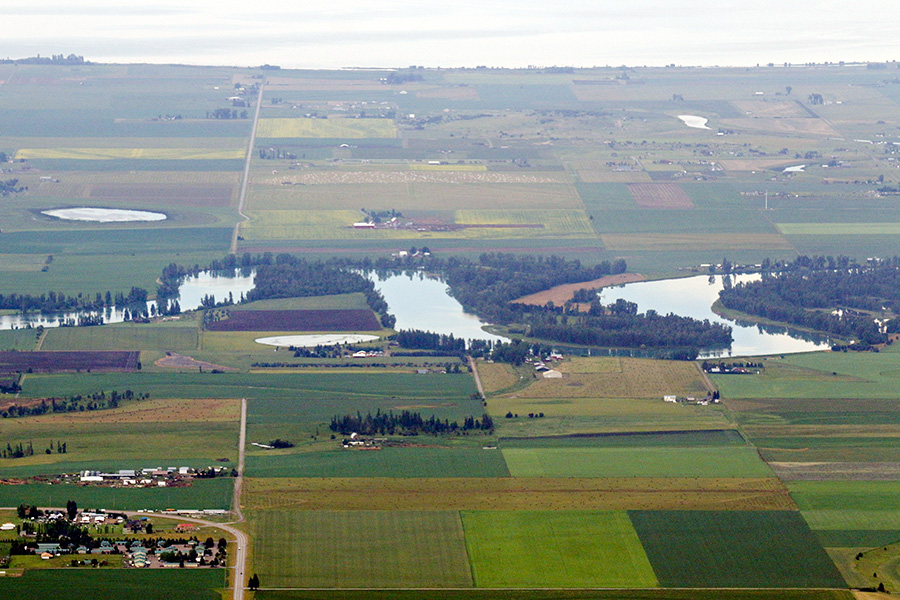Flathead Judge to Determine Legality of Egan Slough Ballot Initiative
Attorneys for bottling plant argue initiative to restrict Creston bottling plant is illegal
By Tristan Scott
A Flathead County district judge heard arguments this week in a lawsuit filed by opponents of a water-bottling plant near Creston, which plaintiffs say has continued to produce and distribute bottled water despite a citizen-initiated ballot measure deeming the operation unlawful.
The lawsuit — filed by the Egan Slough Community, Yes! For Flathead Farms and Water, and resident Amy Waller — was filed last September in Flathead County District Court against the Flathead County Commission, the Flathead County Planning Department, the Flathead City-County Health Department, and the Montana Artesian Water Company.
Flathead County District Judge Robert Allison on May 21 heard oral arguments from attorneys on both sides of the wide-ranging issue, with counsel for defendants seeking to dismiss the lawsuit through partial summary judgment based on their contention that the ballot initiative, which passed last June with 70 percent of the vote, is illegal on its face.
Controversy over the Montana Artesian Water Company (MAWC) began as soon as the company’s owner, Creston landowner Lew Weaver, applied for permits from the state Department of Environmental Quality (DEQ) and Department of Natural Resources and Conservation (DNRC).
Weaver received a permit with the DNRC that would allow his company to produce up to 140,000 water bottles per hour, 24 hours a day, seven days a week. The water right would allow Weaver’s company to receive 710 acre feet of water annually, equaling roughly 1.2 billion 20-ounce water bottles.
Opponents to the water-bottling facility have pushed back against the project through various legal channels, including a ballot initiative that expanded the Egan Slough Zoning District, which protects the land’s agricultural character. The zone also prohibits most industrial uses.
Those changes added 530 acres to the existing 1,150 acres in the zone, including Weaver’s facility, which, under the zoning district, is in violation of the district’s regulations.
Attorneys for MAWC have moved for summary judgment in the case saying the ballot initiative is illegal on six independent bases, including that it impacts a small fraction of county residents, even though it was put up for a county-wide vote.
Billings attorney Victoria Marquis, representing MAWC, said the initiative also falls flat “because it equates to illegal reverse spot zoning” and does not comply with the county’s growth policy.
Meanwhile, in a separate legal dispute, a district judge in March reversed and remanded the state’s decision to allow the facility to begin production, ruling that the DNRC erred when it granted a permit allowing production.
The appeal period for that order has not yet expired, and may still be challenged either by MAWC or the state DNRC.
“If it is not appealed, the remaining analysis to be completed by the Department of Natural Resources and Conservation is not clear and remains to be completed,” Marquis wrote in the motion for summary judgment. “Therefore, some features of Montana Artesian’s Water Right, including the volume, remain in limbo.”
MAWC began producing and filling water bottles last summer, and the latest lawsuit accuses the county commission of failing to enforce zoning regulations, which will affect property values. Waller, one of the plaintiffs in the case, farms her property near Egan Slough and said her “property, and her property values, are and will be severely and adversely affected by the operation of the water bottling plant,” the lawsuit states.
The lawsuit contends that the production plant’s operations were not grandfathered in, because the health department signed off on an updated Food Manufacturing License for the plant on June 22, one day after the election was certified.
Plaintiffs’ attorney David Wilson said MAWC’s operations continue to be unlawful, and the county is not undertaking its legal duty to enforce the zoning regulations and prohibit the operation.
Instead, he said, “it is facilitating its operation” by signing off on the Food Manufacturing License.
However, Marquis said the plaintiffs have wrongly implied that MAWC can no longer operate because under state law it may “lawfully continue operating under the statutory exception to permit requirements” by producing water at a conservative volume.
Should the judge agree with them, the plaintiffs seek for the county to enforce its zoning regulations against MAWC; for the county to take back the licenses issued by the health department; and to declare that the water company is in violation of the zoning district.
Judge Allison said the court would issue a ruling within two to three weeks.